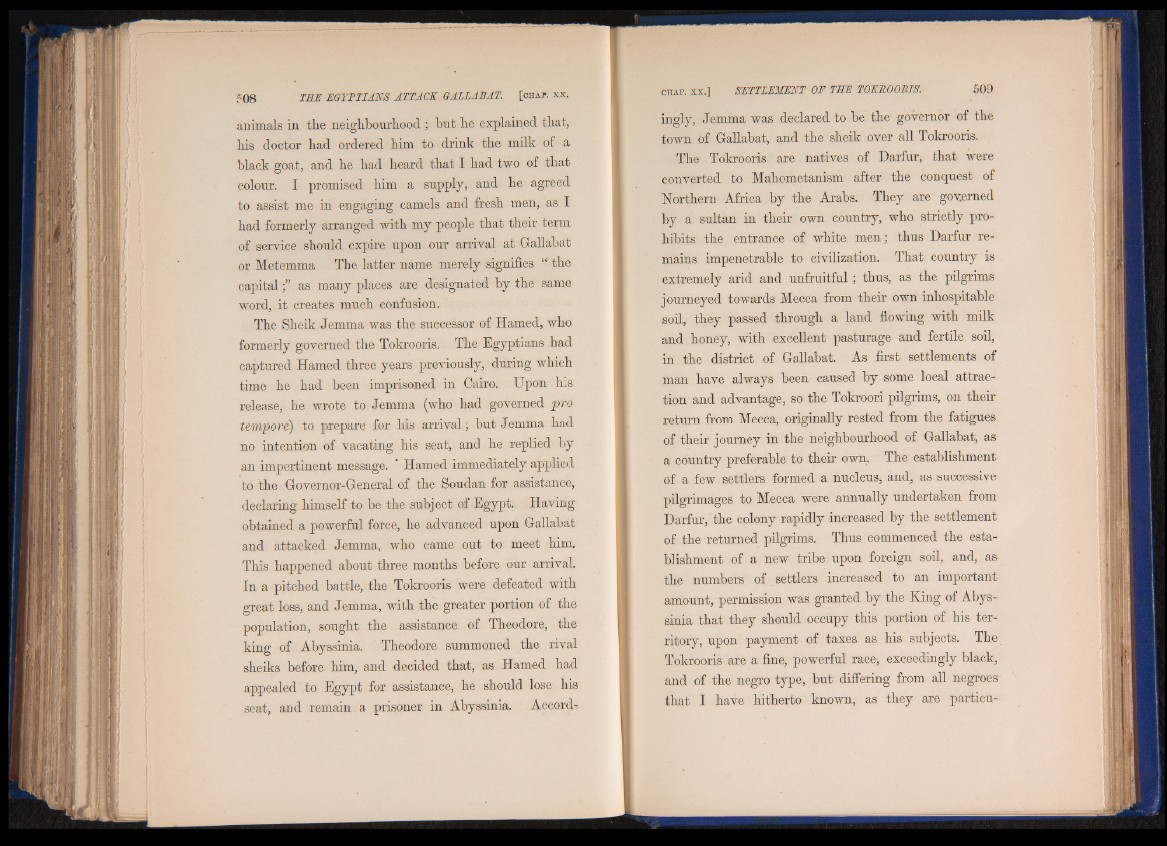
n . n i m a . l s in the neighbourhood ; but he explained that,
his doctor had ordered him to drink the milk of a
black goat, and he had heard that I had two of that
colour. I promised him a supply, and he agreed
to assist me in engaging camels and fresh men, as I
had formerly arranged with my people that their term
of service should expire upon our arrival at Gallabat
or Metemma The latter name merely signifies “ the
capital ;” as many places are designated by the same
word, it creates much confusion.
The Sbeik Jemma was the successor of Hamed, who
formerly governed the Tokrooris, The Egyptians had
captured Hamed three years previously, during which
time he had been imprisoned in Cairo. Upon his
release, he wrote to Jemma (who had governed pro
tempore) to prepare for his arrival; but Jemma had
no intention of vacating his seat, and he replied by
an impertinent message. * Hamed immediately applied
to the Governor-General of the Soudan for assistance,
declaring himself to be the subject of Egypt. Having
obtained a powerful force, he advanced upon Gallabat
and attacked Jemma, who came out to meet him.
This happened about three months before our arrival.
In a pitched battle, the Tokrooris were defeated with
great loss, and Jemma, with the greater portion of the
population, sought the assistance of Theodore, the
king of Abyssinia. Theodore summoned the rival
sheiks before him, and decided that, as Hamed had
appealed to Egypt for assistance, he should lose his
seat, and remain a prisoner in Abyssinia. Accordingly,
Jemma was declared to be the governor of the
town of Gallabat, and the sheik over all Tokrooris.
The Tokrooris are natives of Darfur, that were
converted to Mahometanism after the conquest of
Northern Africa by the Arabs. They are governed
by a sultan in their own country, who strictly prohibits
the entrance of white men; thus Darfur remains
impenetrable to civilization. That country is
extremely arid and unfruitful; thus, as the pilgrims
journeyed towards Mecca from their own inhospitable
soil, they passed through a land flowing with milk
and honey, with excellent pasturage and fertile soil,
in the district of Gallabat. As first settlements of
man have always been caused by some local attraction
and advantage, so the Tokroori pilgrims, on their
return from Mecca, originally rested from the fatigues
of their journey in the neighbourhood of Gallabat, as
a country preferable to their own. The establishment
of a few settlers formed a nucleus, and, as successive
pilgrimages to Mecca were annually undertaken from
Darfur, the colony rapidly increased by the settlement
of the returned pilgrims. Thus commenced the establishment
of a new tribe upon foreign soil, and, as
the numbers of settlers increased to an important
amount, permission was granted by the King of Abyssinia
that they should occupy this portion of his territory,
upon payment of taxes as his subjects. The
Tokrooris are a fine, powerful race, exceedingly black,
and of the negro type, but differing from all negroes
that I have hitherto known, as they are particu